Paris attacks: Assessing the economic impact
- Published
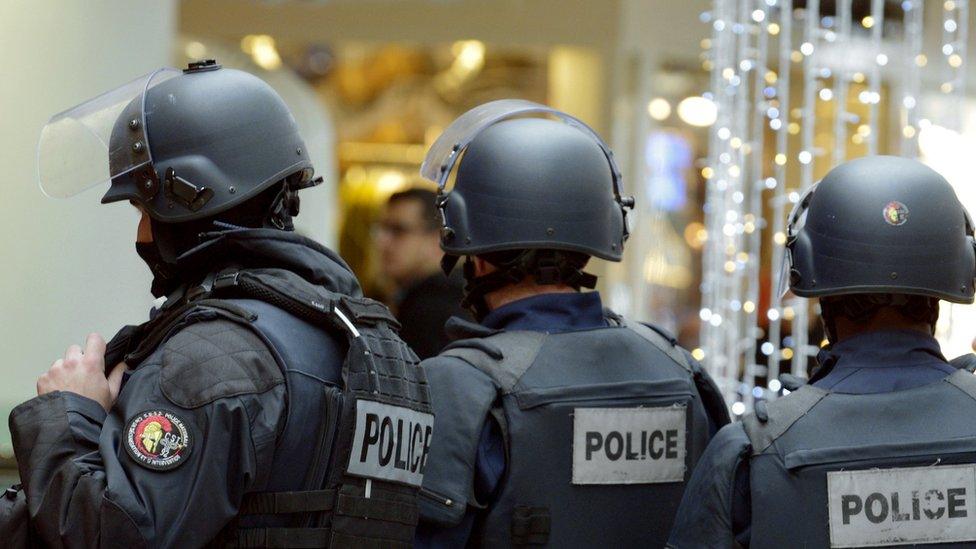
Europe's governments have stepped up security in the wake of the attacks
The events in Paris were a human tragedy. For many people directly affected or close to some who was, the scars, physical and emotional, will endure.
And there will be a wider impact on the foreign policy of Europe and on domestic security.
Will there also be economic damage to add further pain for France, Belgium and the rest of Europe?
In the short term, the answer is a clear "yes" for some people and businesses. In the longer it's less certain, more of a "quite possibly".
The most immediate impact is on businesses dependent on tourism. It is a very important sector in France, especially Paris. For the country as a whole it accounts for two million jobs and 7% of economic activity according to the Tourism Promotion Council, external.
Many would-be visitors cancelled their plans to go to Paris or Brussels.
In the case of Brussels, 40% of hotel bookings were cancelled over the weekend of the security clampdown according to Olivier Willocx, head of the Brussels Chamber of Commerce.
Martin Duchateau, who runs a hotel in the city, spoke of a similar story after that disruption which came a week after the attacks in Paris. He couldn't put a precise figure on the losses but told BBC World Service it was thousands of euros.
Missing tourists
It was a similar story in Paris.
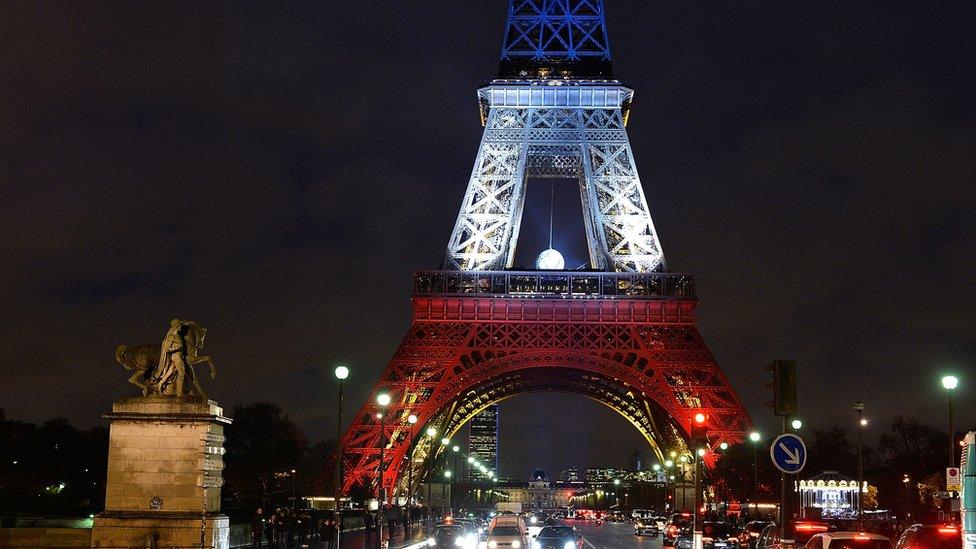
Many would-be visitors cancelled their plans to go to Paris or Brussels
The Paris Convention and Visitors Bureau reports that hotels had a sharp fall in the number of visitors, though the trend has begun to reverse. The impact was bigger than after the Charlie Hebdo attack in January, it says. That is perhaps to be expected as tourists were targets this time.
Quite apart from those cancellations, fewer tourists mean lost business for restaurants, shops, tourist attractions and taxis.
There was more evidence of an immediate effect in France from a regular business survey, by the financial information firm Markit. It found, external services companies saying they had been affected by the attacks. Some respondents in the survey suggested that confidence had been hit.
These are all immediate short term impacts. But will there be any lasting economic damage?
The pattern in previous events in the developed world - New York, London, Madrid, Boston - has been one of short term effects followed by a return to something more like normality.
Peter Praet who is a member of the Executive Board of the European Central Bank made that point in an interview with Bloomberg, external.
"Usually these sorts of events have a transitory effect on the economy so this is not a priori a reason to change the way we see the evolution of the European economy."
Eurozone frailty
Certainly the financial markets have shown little sign of expecting a prolonged adverse impact across the economy. The French market did drop when trading began on the Monday after the attacks, but it quickly regained ground. It is now above the level it was before.
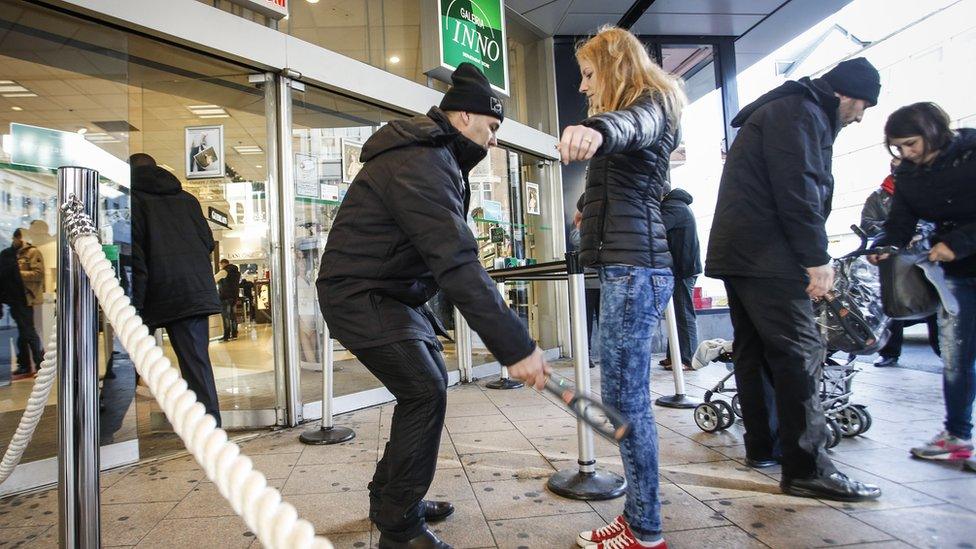
Increased security measures are now in place across Belgium as well as France
Investors did however show some concern about the tourism business. AirFranceKLM share prices fell sharply and so did Accor, the French hotels group. IAG, the holding company for British Airways and Iberia of Spain, also fell but more moderately. All have regained some of what they lost. The German carrier Lufthansa fell in the immediate aftermath of the attacks but are now ahead of where they was before.
There have been some signs that suggest that the possibility of a wider and more lasting impact should not be dismissed altogether. The eurozone is recovering from a recession, but not very robustly. Confidence is important.
In the same Bloomberg interview, the ECB's Peter Praet had a cautious note to add to the observation that economies usually bounce back after terror attacks:
"It's clear these sort of events do not help restoring confidence in the recovery, so this is something we will watch."
This concern was also expressed by the chief executive of the German industrial giant Siemens, Joe Kaeser in an interview with the Financial Times, external:
"The biggest concern is the fallout from the geo-political distress, We have seen a new quality from the sad events in Paris. And people who are not in a good mood are not going to invest. Because investing is about believing about looking forward about the future."
There will be some costs to European governments. France has mobilised additional personnel, having already increased security spending earlier this year, in the months after the Charlie Hebdo attack.
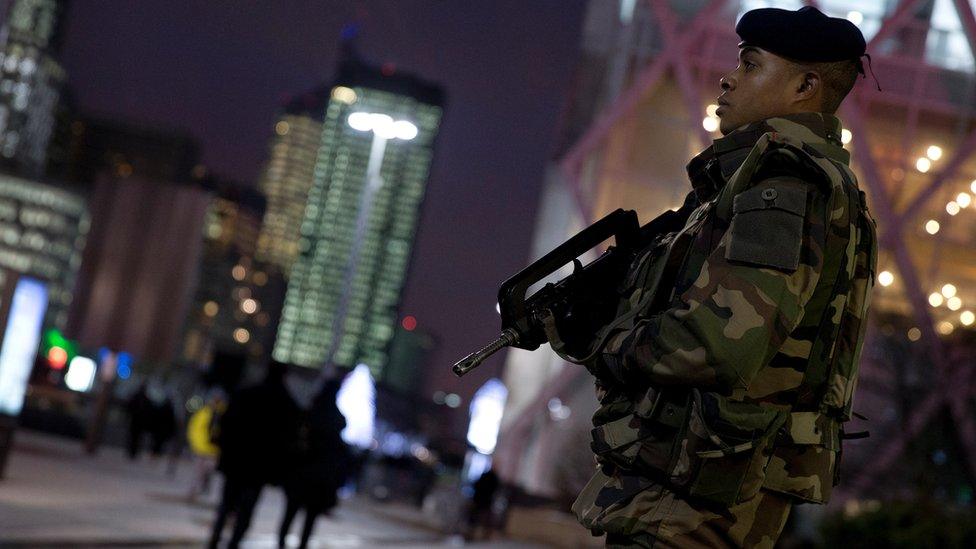
Increased security will be an additional cost for many governments
They are likely to get some extra latitude from the European Union over the targets they are expected to meet in managing government finances.
The European Commission President Jean-Claude Juncker has said: "I think these should not be treated as ordinary expenses in the Stability Pact," these are the EU rules that set a limit on annual government borrowing of 3% of national income or GDP.
All the same, if they are going to spend more on security it means one of three things: higher taxes, more borrowing or cutting other areas of spending.
Border controls
The events in Paris also raise questions about the future of the EU's system of unrestricted travel across borders. It is an arrangement known as "Schengen" after the Luxembourg town where the agreement was signed. It covers most EU members, though not Britain. A few non-EU countries including Switzerland have signed up.
In the wake of the attacks the French government re-imposed border checks. It is true they were planning to take these steps anyway ahead of the UN climate conference in Paris, but the French Interior Minister Bernard Cazeneuve says France would maintain the controls "as long as the terrorist threat requires us to do so".
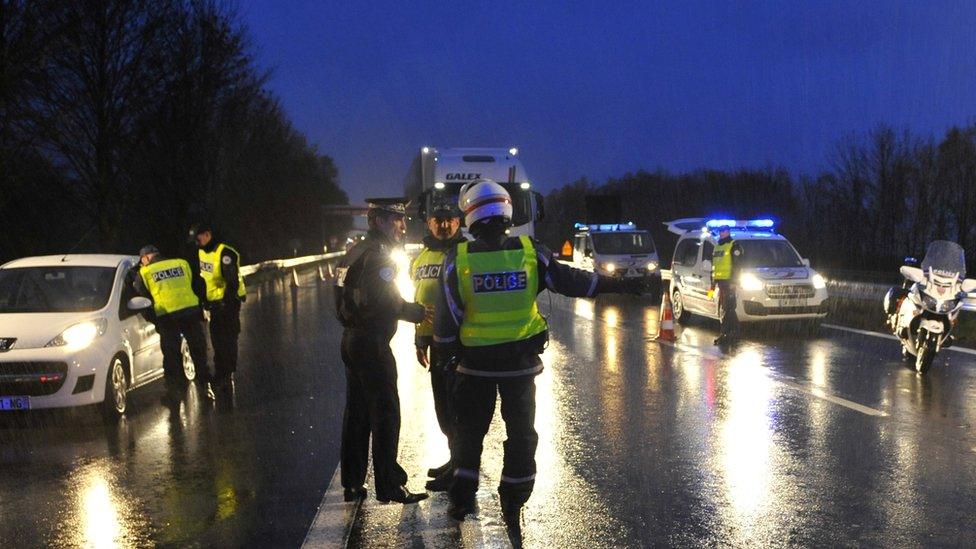
Border controls are back, and if this becomes permanent and widespread they are likely to have an economic impact
There is another issue that has led to revived border controls in the EU - the refugee crisis. But the attacks in Paris add a new factor that raises major questions about the future of the EU's free internal movement, and tellingly Mr Juncker has said that "the Schengen system is partially comatose".
The end of Schengen free movement would have economic consequences for some. Those most obviously affected would be the workers who commute across borders - there were 780,000 of them back in 2007, according to research commissioned by the European Commission.
Hugo Erken, an economist at Rabobank of the Netherlands warned of a potential adverse long term impact on trade, external if renewed border controls were to become permanent. He was writing about the possible implications of the refugee crisis, but the events in Paris only aggravate the challenges to Schengen's future.
The Paris attacks came against a background of political and economic uncertainties in Europe that suggest some chance of longer lasting effects than we have seen after previous similar terrible events.